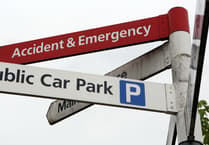Last year the the British Red Cross organisation featured letters from First World War nurses on its website and one of them featured a nurse working at the Anderson family’s home at Waverley Abbey House.
The full letters can be found at https://www.redcross.org.uk/stories/our-movement/our-history/letters-from-a-first-world-war-nurse but we feature a large excerpt below and wonder if Dorothy is featured in either of these two images from the hospital.
“Miss Dorothy M Robinson, daughter of Major General Sir C W Robinson KCB (ex-Rifle Brigade), was a nurse at Waverley Abbey Military Hospital in Farnham, Surrey, during the First World War.
“Showing great spirit in adversity, Dorothy tells her mum about the trouble she goes through to get a bath, the jokes wounded servicemen play, and the anticipation everyone feels when the Zeppelin warning bell goes off one night.
“December 3rd, 1915.
“My dearest Mother,
“Thank you so much for forwarding Joan’s letter. I am glad she is getting on so well. I think that all things considered, it is much better that Gladys Goument is not coming here. Her cousin really made a very bad character for herself and as everybody knows it and would associate Gladys with it, it would not be very nice for her.
“I met another Waverley Abbey girl at the station and drove up in her motor and sent the two lots of boxes on the cab that came to meet me! Jamie met me in the Hall and I could not see the Commandant as she was out, since then I’ve tried four times to see her, and always hit the time she is out. I really can’t make another effort as I shouldn’t know what to say when I did see her, all this time after my arrival!!
“I am sleeping in what is known as the Cubicles. It is a large room divided into seven cubicles and is just above the stables. Now the stables are used as a laundry, so you can imagine there is no fear of my being cold at night. They really are awfully nice cubicles, and the bed is a very comfy one, but I’m exceedingly glad I had the electric torch with me that daddy gave me on my birthday as you have to find your way in the dark across a very cobbly and at present very puddly courtyard, through the wash tubs of the laundry and up a sort of wooden staircase!
“The fun comes when you want a bath and have to run across the aforesaid courtyard in your nightdress (I usually put on a coat!) with your towels etc. Jamie is sleeping in the house and would have asked if I could be up in her room, only the spare bed there was so very lumpy, she thought she could not commit me to it!
“I am in a ward known as the Lady of the Lake with two other smaller wards attached to it called Abbot A and Abbot B. One thing, I shall know the names of some at least of Scott’s novels as a result of being here. Jamie is second nurse and I’m third which is a ripping arrangement. She is supposed more or less to be in the Abbot ward while I’m in Lady of the Lake. As a matter of face we hop pretty freely between the two. As there are wardmaids under us, we have all the nice part of the work without any of the other!
“Yesterday an officer brought over some men of his regiment and they gave a variety entertainment. They were most clever. A conjurer, a musician and a ventriloquist came. All the patients were taken into the Monastery Hall. The ones that could not move were put on stretchers on the floor and the others were in chairs etc. They enjoyed themselves most awfully.
“Jamie and I only saw a small part at the end as we had a whole lot of dressings etc to prepare, but to judge from the cheering and laughing that went on it must have been a most brilliant performance. I think it was a very good idea of the officer’s myself as he could select the most suitable men, and they naturally know exactly the sort of thing that amuses Tommies.
“How are you all getting on? I hope nothing new has turned up which requires a vast amount of energy to meet it!
“Please give my love to Daddy and Charlie.
“Your loving daughter Dorothy.
“Jamie and I are getting quite expert at calling each other Beverley and Gaisford. I occasionally omit to answer but that is a minor detail. Jamie’s day off is Monday and mine is Tuesday.”
In 1916 Dorothy reports dealing with rheumatic or spotted fever, having to ‘carbolise’ the ward as a precaution; managing to get two baths in ten days and then, of course, there were the soldiers’ practical jokes:
“Three of them evidently thought they’d see if they could hide in somebody else’s bed in one of the other wards and come back late without my knowing. I don’t usually go round their end much between 8.30-10, but being Tuesday night I though I would and went in about 9.15.
“Of course I found three empty beds. Knowing the men in them were good sorts and wouldn’t do anything really bad, I said nothing but took away all their bedclothes; which very much upset the gravity of the other patients.
“About 10 o’clock they came back and started hunting quietly for them, not wishing me to hear and thinking one of the other men had played a joke on them. After a bit, one of the men hinted that I might have them and of course they had to come in and ask for them.
“I really meant to scold them but they were so sheepish and taken aback I had to laugh instead. However, I hardly think they’ll try these games again. The monkeys had gone to the ward at the very farthest end of the hospital and had lain under the bedclothes of two of the men there so that there were three in one bed; how the nurse there did not notice an unusual bulkiness I can’t imagine. But they got back without being spotted for which I was rather glad.”
Air raids were also a possibility – “By the way, the Zeppelins came over in our direction, at least one did and the Zeppelin hooter at Aldershot sounded the alarm at 1.50. You can imagine how thrilled we were, but they never came actually over us, but were at Frimley.
“After a bit we telephoned to Aldershot camp (as hospitals are allowed to know on account of the patients) but they had not heard which way it was going.
“In an hour we telephoned to the Flying Corps Headquarters at Aldershot and they said that they had just had a message from the Home Office to say the raid had been beaten back and we need take no further precautions. It appears that they did not get as far inland as they meant to.”
A fascinating account of life in the Anderson family’s family home that helps bring the many photographs of the hospital established there to life. The website is well worth visiting.



